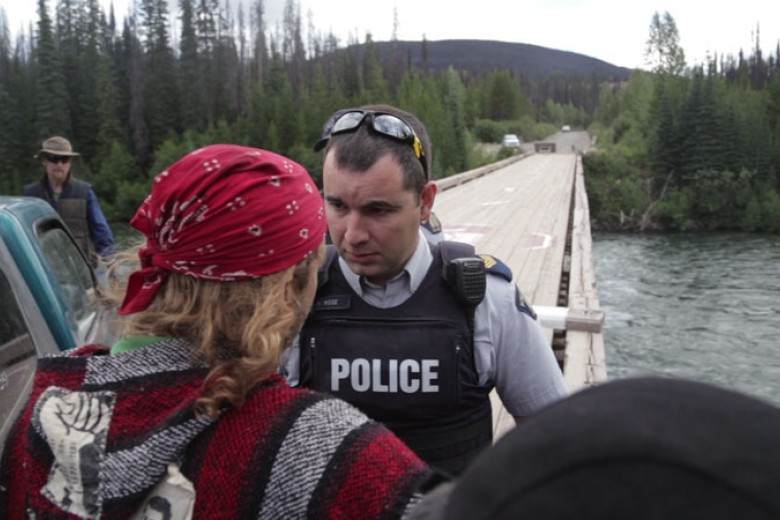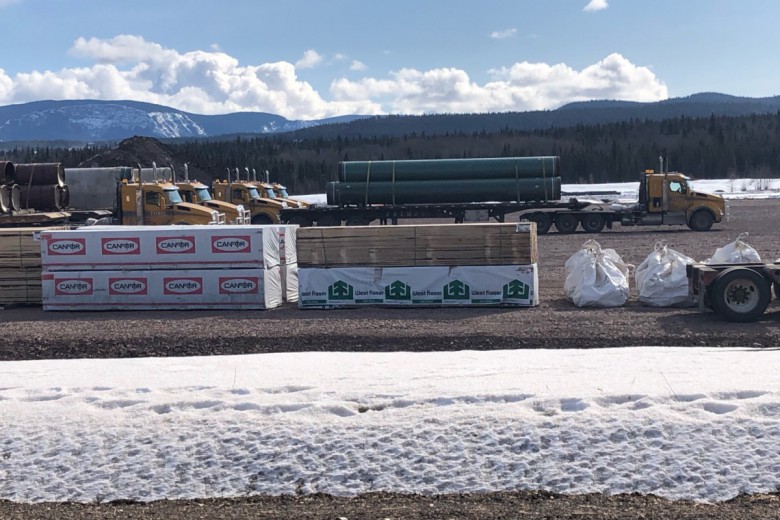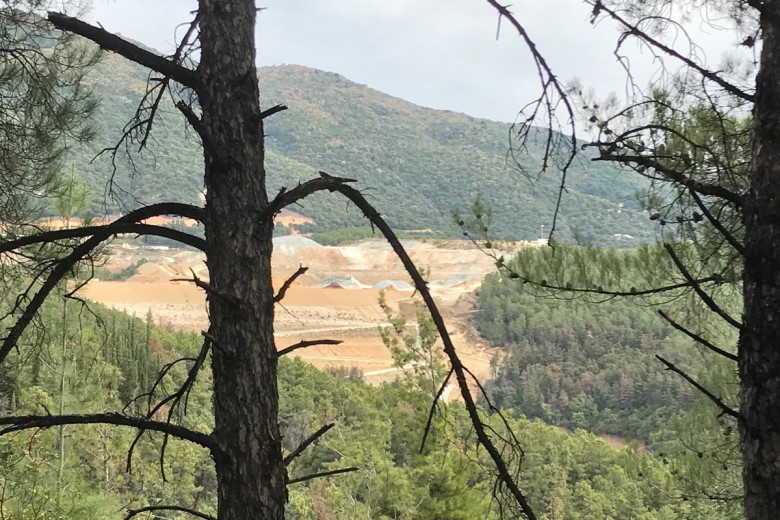The National Energy Board (NEB) attempted to begin hearings in Montreal on TransCanada Corp’s proposed Energy East pipeline on Monday, August 29, the Board’s first stop in Quebec. The proposed Energy East pipeline involves converting an existing pipeline that runs from Alberta through Quebec and into New Brunswick, with new pipeline extensions built on both ends. The proposed pipeline route crosses the St. Lawrence River.
The scene on the street was tense before the event began, and once underway, the hearing was quickly interrupted by protesters, and promptly cancelled. The second day of hearings, scheduled for Tuesday, was also preemptively cancelled by the NEB.
In attendance on Monday was Montreal mayor Denis Coderre, who planned to voice serious concerns about the NEB following his recent call for an immediate suspension of the hearings process, a call previously made by dozens of organizations.
The reason? The NEB’s public image as being too cozy with industry was cemented, especially in Quebec, when it was discovered in July by the National Observer that a consultant for TransCanada, former Quebec Liberal premier Jean Charest, met with senior members of the Energy Board to advise them on how to engage with Quebecers. As mayor Coderre put it last week, “I’m not sure of the impartiality of the process.”
And so, on Monday morning, people flocked to the hearing. To the surprise of environmentalists, the crowd included a contingent from the Canadian Piping Trades Union Local 144, who rallied in support of Energy East.
Alyssa Symons-Belanger was there to protest against the NEB process and against Energy East. Symons-Belanger has also fought Enbridge’s Line 9 pipeline, including by locking herself to the Montreal terminus of the pipeline along with two other women in 2014.
David Gray-Donald, writing for Briarpatch, caught up with Symons-Belanger on Monday to talk about greeting the NEB during its first attempt to hold an Energy East hearing in Quebec.
David Gray-Donald: Why did you go to the NEB hearings in Montreal this morning?
Symons-Belanger: I went to the NEB hearing today to disrupt the corrupt evaluation of Transcanada’s Energy East. We’ve heard that there was much corruption from the commissioners, linked to Jean Charest (former Liberal premier of Quebec) who was representing TransCanada. We could see from a number of groups that there was really a strong opposition to the NEB hearing. And also from Denis Coderre (current mayor of Montreal), who had denounced [the NEB hearing] recently.
DG-D: Could you tell us about the situation outside the hearings, before you went in?
S-B: Three of us showed up at 7:30 am. The protest was called for 8. We were there to set up a giant pipeline and some banners for people. And when we arrived at 7:30, the workers who were in favour of Energy East were already present. They were very numerous. They all had the same signs. They were almost all men. They were there to defend their point of view, which is okay.
So when we arrived, and the moment we arrived, I started getting cat-called. As more protestors against Energy East arrived and as the situation got more and more tense, we were getting racist, sexist comments from the workers. We were starting to have peaceful debates, and we were constantly confronted by lots of men yelling at us.
Things got really tense at a few moments but then it was easy for us to just leave the situation when the NEB hearing started and we could easily get in.
DG-D: Did you know beforehand you were going to go in?
S-B: I knew I wanted to go in but I didn’t know who else wanted to and I didn’t know with what tactic, but we spoke beforehand, a few of us as we were going into the actual hearing, and we decided we were going to clap without stopping. So I went inside and it was open to the public so anyone could go.
I didn’t expect for Pierre-Olivier to go up [running to the front of the hearing] like that to disrupt it the way he did, but our goal was to applaud continuously without stopping. When he went in front [of the room], we decided to join him in solidarity with the action he was doing and also to bring support, and to make sure the action was carried through. When we were doing the action, it was clear we could actually stop the NEB hearing. So we continued and we demanded that the commissioners leave the room. And then Denis Coderre left the room. Then we continued pressing for the NEB commissioners to leave the room because for us the NEB hearing was not at all credible.
DG-D: When the meeting was disrupted, videos show security getting involved, then later clips show many police there, using force. What happened?
S-B: There were maybe 10 to 15 minutes where we were up front and chanting and people were responding to us. And then the police, we could see in the corner of the room they were gathering and speaking about what sort of strategy they would use. At that point, the NEB commissioners had not left, and we were asking them to leave. So when we saw that the police were coming through the room, we decided to go in the corner where the commissioners were so it would force them to leave because they would be stuck in a situation where police were arresting us and we were between them. So the commissioners left at that time.
And the police were escorting us out. I think one of the tactics that we used is to become numb when the police were making arrests. As that was happening one policeman was holding my arm very hard for me to leave, so I jerked my arm to leave, then he grabbed my arm and twisted it. I was trying to not let him do that because it hurt. He was using pressure points so I was trying to move around so it would hurt less. And I got really mad. They brought us outside and they put handcuffs on me, and brought one of the protesters to the station because he was accused of attacking a policeman. For me, they were trying to see if I was breaking a condition [imposed after arrest for the Line 9 action in 201], but I wasn’t, so they had to release me. They released me very far from the protest. I’m facing a charge, it might be obstruction but they’re sending it by mail, so I’m not sure.
DG-D: So what do you think of what happened?
S-B: I think it’s great. We stopped the NEB from happening in Montreal for at least the next two days. And I think it’s nice to be able to show a different type of tactic which is really just to go and do it. And we know there were a lot of people against the project. A lot of people have asked for the NEB hearings to be cancelled, even the mayor. So, the fact that the NEB doesn’t listen and doesn’t care, we have to respond to that.
A lot of folks have criticized the fact that we have not used the proper image, by showing some kind of violence. There’s a lot of importance being put on the image, but sometimes the image is not important. What we are doing is important. The actions of what we are doing is important. I am not a violent person. I am fighting against multinationals and industrials that don’t fucking care about the environment. So, after allies or non-allies say that what we have done doesn’t look professional, I don’t care, because what we did is we actually used direct action and we are trying to show that there has to be interesting resistance against Energy East, and if there’s not, this project is just going to go pass under our nose.
DG-D: How much does public opinion matter in the fight against Energy East?
S-B: Public opinion does matter in this case because it makes a lot of solidarity and bonds between groups that are not used to organizing with each other. The Energy East is such a long project that touches so many regions, from the countryside and from the city, and from different social classes and lines of work. There is a lot of resistance, and the fact is that when we do this type of direct action we feel supported because we know that we are defending also a lot of people’s point of view, and that it is very legitimate to actually go against these projects because there are so many people who are against it.
I think most people in Quebec are aware that the NEB’s hearings process is corrupt. You have authority figures, like Denis Coderre, who also is concerned about he NEB hearings. So it is pretty convincing for most people to see that the NEB is not transparent. So from what I’m seeing, and the way that media in Quebec is bringing this news, I feel there is something altogether within the province that is against it, and thus it is not easy for TransCanada to be able to bring a good public image in Quebec.
DG-D: Has anything changed in discussions of Energy East in Quebec since Trudeau came in?
S-B: No. They said there were promises to review the NEB. [The way I see it], it never has been done.
DG-D: So what is next in the struggle against this project?
S-B: A growing movement of people that are against this pipeline, and also different resistance tactics. It will be interesting to see people become more and more confident in using these types of tactics, and that people can see there is a direct effect in using direct action.
DG-D: And what do you want to see from English Canada?
S-B: Energy East is a project that concerns people from English Canada. We can create links that are outside just the border of Quebec, and join more and more in solidarity, and also to be able to continue this fight with First Nations, and in solidarity with First Nations affected by the tar sands. So, we have to stay local, we have to focus on where we are to have a strong impact, but continue to be connected to people throughout the country. Whatever is happening with other struggles against other pipelines, either in Canada or in the U.S., the fact that there is resistance everywhere, we’re all feeding off of each other’s resistance and we’re sending a lot, a lot of strength and a lot of love when we see other people fighting for the same causes we are.
DG-D: Thanks. Anything else you want to say?
S-B: I feel really good about this action…
[pause]
It’s really hard to see yourself scream on TV. Like, I started swearing on TV, you know. That’s really against every direct action course I’ve given or taken on what is your public image. To be calm and to look good in front of media. But seriously, there is something really beautiful about something that is impulsive, and that when you feel in your gut that you have to do it and you just go. And after, yes, I reacted and I reacted strongly, but I think that it’s okay. And we have to break up sometimes that mirror of illusion which is the media and what the media wants portrayed and what is the good person, and to be like “hey, this guy is fucking hurting my arm and I’m going to fucking tell him that he’s hurting my arm” and I don’t care if there’s cameras there, and I don’t care if people will judge me, because this is not okay. There’s something about resistance, and using your anger well and breaking that illusion we have in society.
This interview has been edited for brevity and clarity.


_780_520_90_s_c1_c_c.jpg)



